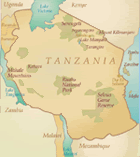Umeme
In the so-called “Western” world we take so much for granted. We know that in general our traffic lights will work and be synchronized during rush hour; the city water will flow into our sink, tub and toilet – and we can even drink it without getting sick; that potholes in the road will eventually get filled in (even in DC); and that someone from the city will be by to pick up our garbage during the week.
And most importantly, we know that excepting a major storm or freak power grid accident, the electricity (umeme in Swahili) will work 24/7.
Here in Tanzania you can’t take any of that for granted. The traffic lights are often out, my water is shipped into a cement tank in my front yard once a week (and drinking it will give us cholera), the potholes on my street will never be filled unless I pay someone to pile some dirt in there – although it will all get washed away during the next big rainstorm, and the rich (myself included) pay for special garbage pick up while most others burn their garbage in big rubbish heaps in the evening.
And you never know when the electricity will be on or off.
Here everyone calls it “the umeme problem”.
The problem is that without umeme it is damn inconvenient and uncomfortable. Businesses have a hard time operating without expensive generators and most people can no longer keep food in their refrigerators, or keep their fan running during extra hot afternoons.
It hasn’t always been so bad. There used to be a lot more electricity in Dar, even as recently as last year.
Depending on which newspaper you read the reason we have so little electricity in Tanzania (and Dar in particular) is because:
- There is a drought in the center of the country where there are several hydroelectric dams. The dams are so empty of water there is no electricity.
- There is a problem with the turbines at the electric plant. A turbinologist (no kidding – that’s the word one paper used) is here from Finland trying to fix the problem at this very moment.
- Tanzania bought an electricity generating plant from a company in Aruba that went out of business before it could deliver the goods.
- Tanzania bought an electricity generating turbine from an American company that later the US Embassy claimed doesn’t exist in America. Turns out the people are from Aruba and they went out of business before they could deliver the goods.
- The main turbine at the main electricity plant blew up because Dar needed too much umeme. There was no one here who knew how to fix it so they rented a specially fitted 747 to come pick up the machine and bring it back to Norway where it will be fixed and sent back on the same plane and then reinstalled.
I don’t know if any of these excuses, or all of these excuses are true.
I just know that there is no excuse for having no electricity 6 days per week.
And if you ask when the umeme crisis will be over you’ll hear anything from next month to never. Most commonly we are told that the problem will be fixed by January.
I ain’t holding my breath.
Back when I first moved here there was no electricity every other day. Then they decided there would be no umeme during the week, but we’d have it Friday to Sunday. Then they cut off Saturdays and just kept the umeme on Friday and Sunday – God’s days if you are Muslim or Christian (but obviously they forgot about us Jews). Then all of a sudden during the week of Eid we had 6 days straight of electricity. Now we seem to have it only one day a week (they decided for the Christians), but they also instituted evening time brown outs twice a week.
All these changes, it is so hard to keep up.
And I am one of the lucky ones. I have a big ass generator sitting next to my swimming pool that can run the electricity in the entire house – sometimes better than the “normal” electricity that comes on most evenings around 6 PM.
It has made my generator the most valuable thing I “own”. I spend $30/day keeping it running. And I freak out when there are even small problems – like Saturday afternoon when Raymond and one of the guards decided (brilliantly) to clean the generator with water from a hose and it was reported to me that sparks flew and the machine shorted out. I wasn’t home when that happened, but I threw a big fit when I got home to the 95 degree, 100% humidity afternoon to find the generator was broken.
My life was briefly over.
But then Paul, our trusty driver and problem solver, found a fundi who knew just what to do. When the generator turned on an hour later, I went out to kiss it. My baby. My darling. My one and only $12,000 generator.
I’ve been meaning to write this blog about umeme for some time now, but I’ve had a hard time figuring out how to make you understand just how much I love my generator, and just how much Dar is debilitated by the lack of electricity on a daily basis. I also lacked a good story to “bring it home” until this evening.
A few hours ago my friend and former colleague, Matthew, came by for a visit. We were talking about some colleagues from FHI’s office in Kenya who were just here, and then the topic of the continuing umeme problems came up.
“It’s funny,” Matthew told me, “that the Kenyans said they don’t use the same Swahili word for electricity as they do here in Tanzania.”
“What do they use?” I asked.
Matthew said, “I don’t know what the word they use for electricity is, but they told me that in Kenyan Swahili, the word umeme means gonorrhea!”
And that, my friends, just seems to say it all. The Tanzanian government is avoiding umeme. Like a good public health person I should be helping them avoid it. But given the dire circumstances we’re in, I’m hoping they’ll catch umeme soon





 Jaden and Rowan
Jaden and Rowan







1 Comments:
Oh my God, hilarious Hal! Well good thing you work in public health. You'll know what to do if you ever do get that unmeme.
Post a Comment
Subscribe to Post Comments [Atom]
<< Home